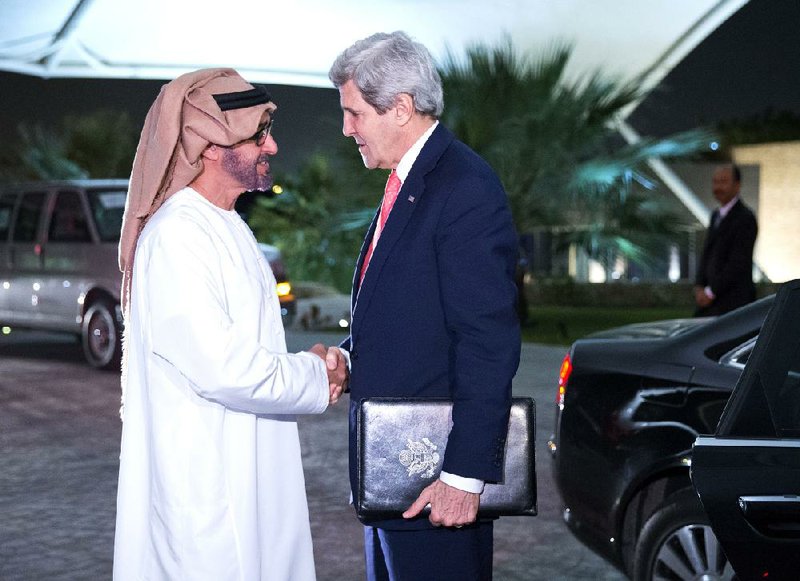ABU DHABI, United Arab Emirates - U.S. Secretary of State John Kerry traveled to Abu Dhabi on Monday for discussions with Emirati officials on the deteriorating situation in Syria, nuclear talks with Iran and the Middle East peace process.
Kerry flew to Abu Dhabi from Jakarta, Indonesia, where he laid into the Syrian government and Russia for the lack of progress in talks aimed at ending the crisis. Kerry slammed Russia, along with Iran, for continuing to support President Bashar Assad’s government, which he said had allowed it to “double down” on its attacks against civilians.
The UAE and other Persian Gulf Arab states have been supportive of the Syrian opposition, and Kerry planned to discuss such assistance as well as humanitarian aid, U.S. officials said.
Earlier, Kerry accused Assad of stonewalling in peace talks and called on Russia to push its ally to negotiate with opposition leaders.
“Right now, Bashar al-Assad has not engaged in the discussions along the promised and required standard that both Russia spoke up for and the regime spoke up for,” Kerry said during a news conference in Jakarta with Indonesian Foreign Minister Marty Natalegawa.
He said Assad’s team “refused to open up one moment of discussion” of a transitional government to replace Assad’s regime.
“It is very clear that Bashar Assad is trying to win this on the battlefield instead of coming to the negotiating table in good faith,” Kerry said
Peace talks in Geneva ended Saturday with no progress toward breaking the impasse in the nearly 3-year-old conflict.
Kerry, who called Syria “a tragedy to the world,” also had harsh words for Assad’s allies in Moscow.
“Russia needs to be a part of the solution and not be contributing so many more weapons and so much more aid that they are in fact enabling Assad to double down, which is creating an enormous problem,” he said.
Russia has told the U.S. it is committed to helping create a transitional government, Kerry said, but has not delivered “the kind of effort to create the kind of dynamic by which that could be achieved.”
On Sunday, Syrian Foreign Minister Walid al-Moallem blamed the U.S. for the breakdown in negotiations, saying the U.S. tried to “create a very negative climate for dialogue in Geneva.”
United Nations Arab League mediator Lakhdar Brahimi apologized to the Syrian people for failing to make progress. “I am very, very sorry, and I apologize to the Syrian people that their hopes which were very, very high that something will happen here,” Brahimi said.
Syria’s conflict started as largely peaceful protests against Assad in March 2011 but later degenerated into a civil war in which more than 140,000 people have been killed, according to activists.
“The talks themselves are taking a recess for the moment,” Kerry said Monday. “But all of us need to remember that there is no recess for the people of Syria, who are suffering.”
Also on Monday, after losing ground to Syrian forces and Islamic extremists for months, the Western-backed rebel movement announced it was replacing its military chief with an experienced, moderate field commander from the south.
The move is part of a broader restructuring aimed at persuading the U.S. and its allies to provide more sophisticated weapons to confront Assad’s army.
Brig. Gen. Abdul-Ilah al-Bashir replaces Gen. Salim Idris, a secular-leaning moderate who was criticized by many in the opposition as being ineffective and lost the confidence of the U.S. and its allies, particularly after Islamic extremists seized a weapons depot from moderate rebels. The move was announced Monday in a statement by the Free Syrian Army’s Supreme Military Council.
Al-Bashir, who previously led the group’s operations in the southern province of Quneitra on the border with the Israeli-occupied Golan Heights, is considered a moderate Islamist. He hails from the region’s most powerful al-Nuaimi tribe, giving him influence among Syria’s conservative rural areas, where tribal connections are important.
Rebels say he has vast knowledge of the areas south of Damascus, where he served as an army commander until defecting to the opposition in 2012. His son Talal, also a rebel, was killed in battle with government forces in Quneitra last year.
In speeches, al-Bashir has said he supports a democratic Syria.
Information for this article was contributed by Diaa Hadid, Barbara Surk, Bassem Mroue and Yasmin Saker of The Associated Press.
Front Section, Pages 6 on 02/18/2014


